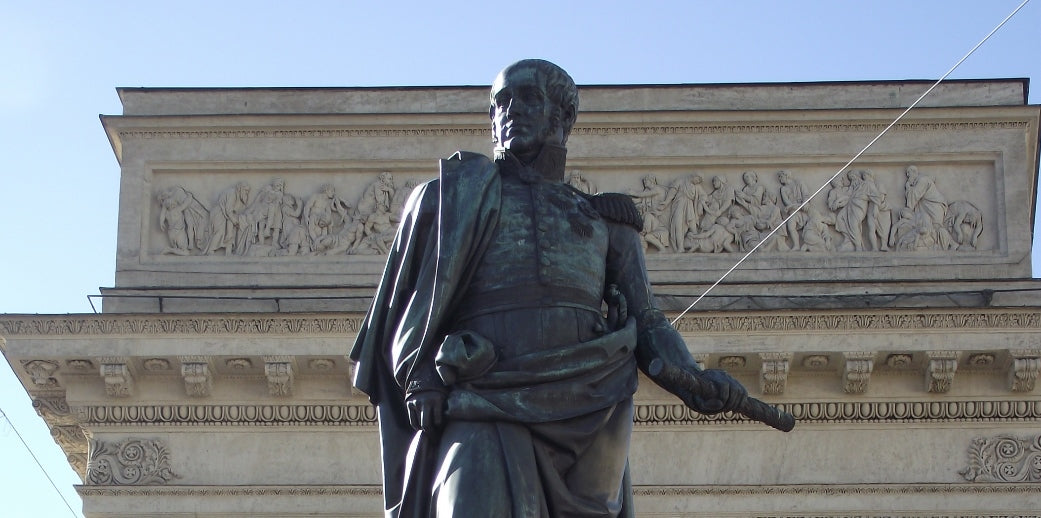People who know me well will be utterly unsurprised that I have included Barclay de Tolly on this list. Read on to discover why I consider him to be one of the greatest generals of the Napoleonic Wars.
Field Marshal Prince Mikhail Andreas Barclay de Tolly (1761-1818)
A Baltic German of Scottish descent, Mikhail Barclay de Tolly was born in 1761 and joined the Russian army at a young age. He saw action in the Balkans and Poland, where he was regarded as a competent if not particularly brilliant officer. He distinguished himself at the Battle of Eylau in 1807 and was seriously wounded in the arm while commanding a rearguard column. When Tsar Alexander visited Barclay in hospital, the general is supposed to have advised the Tsar to retreat into Russia in order to lengthen Napoleon's supply lines. In the event, the Russian army was defeated at Friedland in June and Alexander made peace with Napoleon at Tilsit in July 1807.
After his recovery from his wound, Barclay fought in the Russo-Swedish War of 1808-09, where he led his men across the frozen Gulf of Bothnia and surprised the Swedish garrison at Umeå. The victory over Sweden led to the Russian annexation of Finland, and Barclay was soon appointed its Governor General.
Barclay proved to be a talented administrator and was subsequently appointed Minister of War in 1810. Over the next two years, Barclay worked tirelessly to introduce a reform programme to prepare the Russian Army for the widely expected resumption of hostilities with Napoleonic France. These reforms included creating flexible combined arms operational units, and streamlining the command structure. When the moment came in 1812, Barclay had just finished his reforms and was unexpectedly appointed Commander-in-Chief of the First Western Army, and through his ministerial office had de facto authority over the 250,000-strong Russian army deployed against Napoleon's invasion force.
Barclay recognised that he was significantly outnumbered by the enemy and pursued a strategic retreat, extending Napoleon's supply lines while moving the front closer to the Russian interior, where hundreds and thousands of men were being recruited and trained. Barclay's scorched earth strategy was unpopular among senior Russian commanders, including Pyotr Bagration, the commander of the considerably smaller but operationally independent Second Army, who petitioned for his dismissal. Even his own chief of staff, General Alexei Ermolov, considered him a coward and a traitor.
Despite the intrigues behind his back, Barclay retained his usual coolness and continued to pursue the retreat. Despite a brief reconciliation with Bagration at Smolensk, Barclay's decision to abandon the city's defence after two days amplified calls for his removal. On one occasion Grand Duke Constantine, the Tsar's younger brother and commander of the Imperial Guard, stormed into Barclay's headquarters and cursed him for being a German traitor. Barclay calmly listened to all the insults before the Grand Duke stormed off. The following day Barclay sent the Grand Duke away from headquarters with a message for the Tsar in St Petersburg, in effect sending him away for insubordination. Nevertheless, Barclay was soon superseded by Field Marshal Mikhail Kutuzov, who was appointed Supreme Commander of all Russian forces.
Nevertheless, Barclay retained the command of the First Army and distinguished himself at the Battle of Borodino on 7 September 1812. Barclay constantly exposed himself to great danger as he rode all over the battlefield rallying the troops at all the critical sectors. His conduct won him great acclaim among his previous detractors, among them a mortally wounded Bagration. When the Russian forces encamped at Fili on the western approaches of Moscow in order to defend the city, at the famous Council of Fili Barclay argued that the terrain was unfavourable and risked the army's destruction. This influenced Kutuzov's decision to abandon the city to the enemy.
During the retreat from Moscow, Barclay was seriously ill and was granted leave. By the following spring his health had recovered and he returned to the field, initially as commander of the Third Army, as Russian forces swept across central Europe alongside the new Prussian allies. Kutuzov had died of illness in April 1813. After the allied defeat at the Battle of Bautzen in May, Barclay was promoted to commander-in-chief of the allied Russian-Prussian army. The entrance of the Austrians into the alliance resulted in a reorganisation of the command, but Barclay remained the senior Russian commander. He led the Russian contingent in Austrian Field Marshal Karl von Schwarzenberg's Army of Bohemia, playing a key role in the victories at Kulm and Leipzig. By March 1814 he led his victorious Russians into the gates of Paris. He died in May 1818 while travelling to Germany in order to seek a cure for his failing health.
If you enjoyed reading this post, please check out our Barclay de Tolly designs below.
Barclay de Tolly Russian Generals Text Art Print:

Barclay de Tolly Matryoshka Mug:




Share and get 15% off!
Simply share this product on one of the following social networks and you will unlock 15% off!